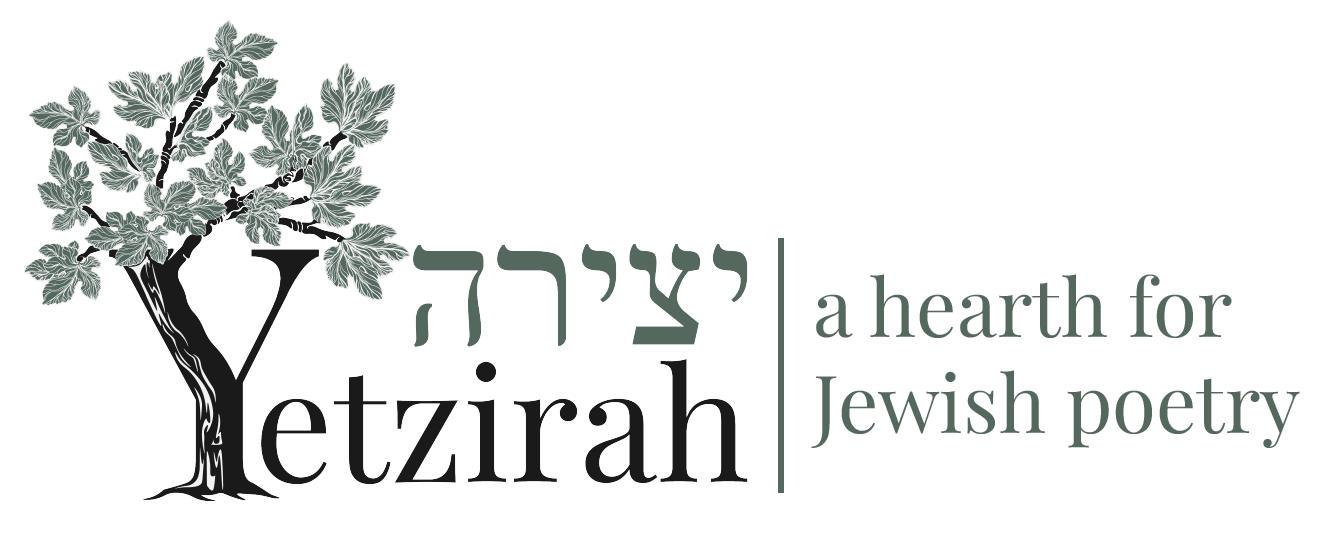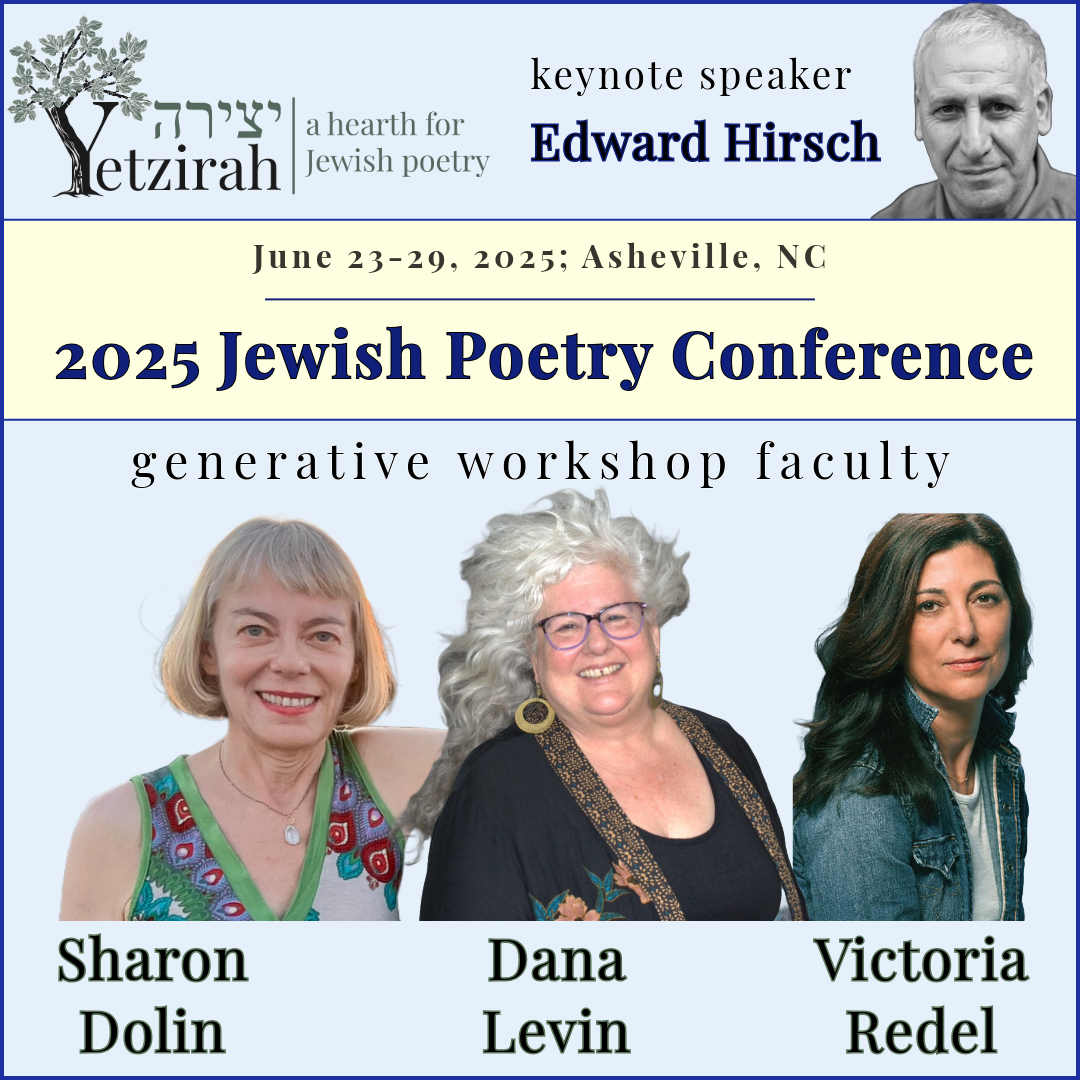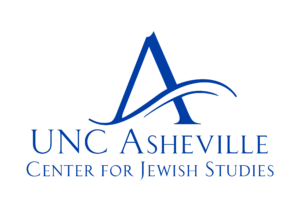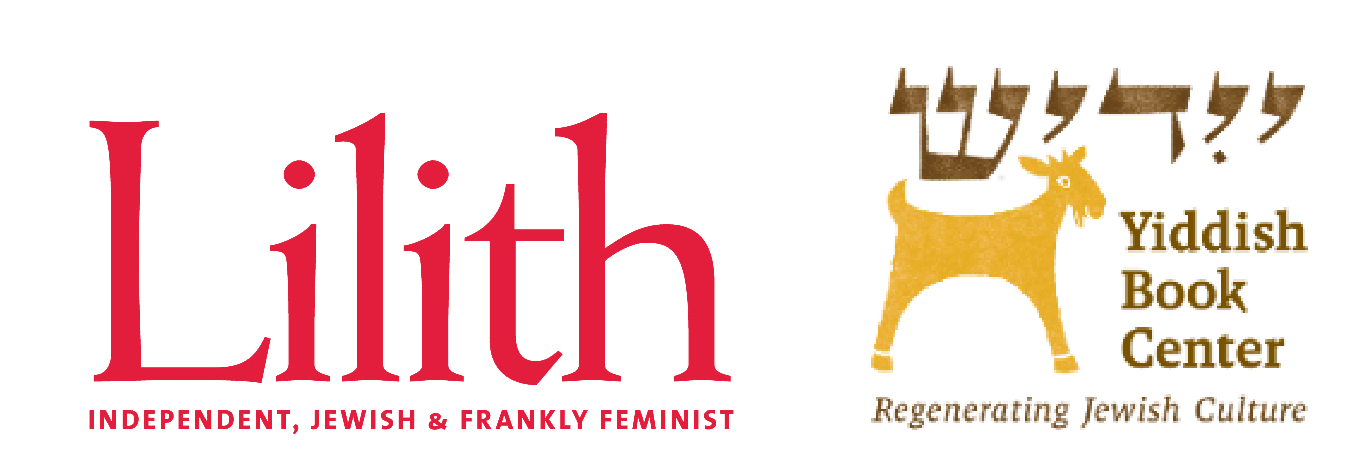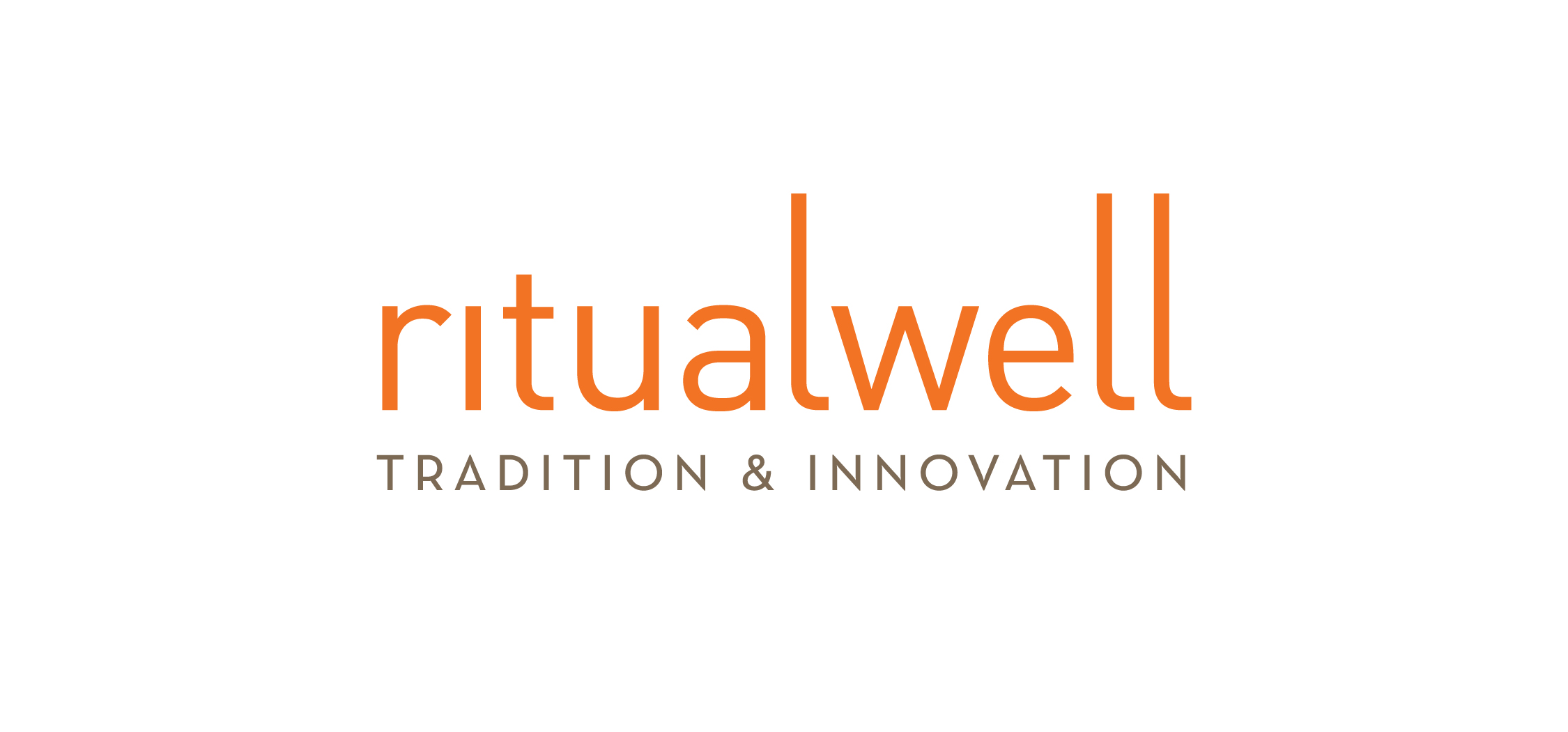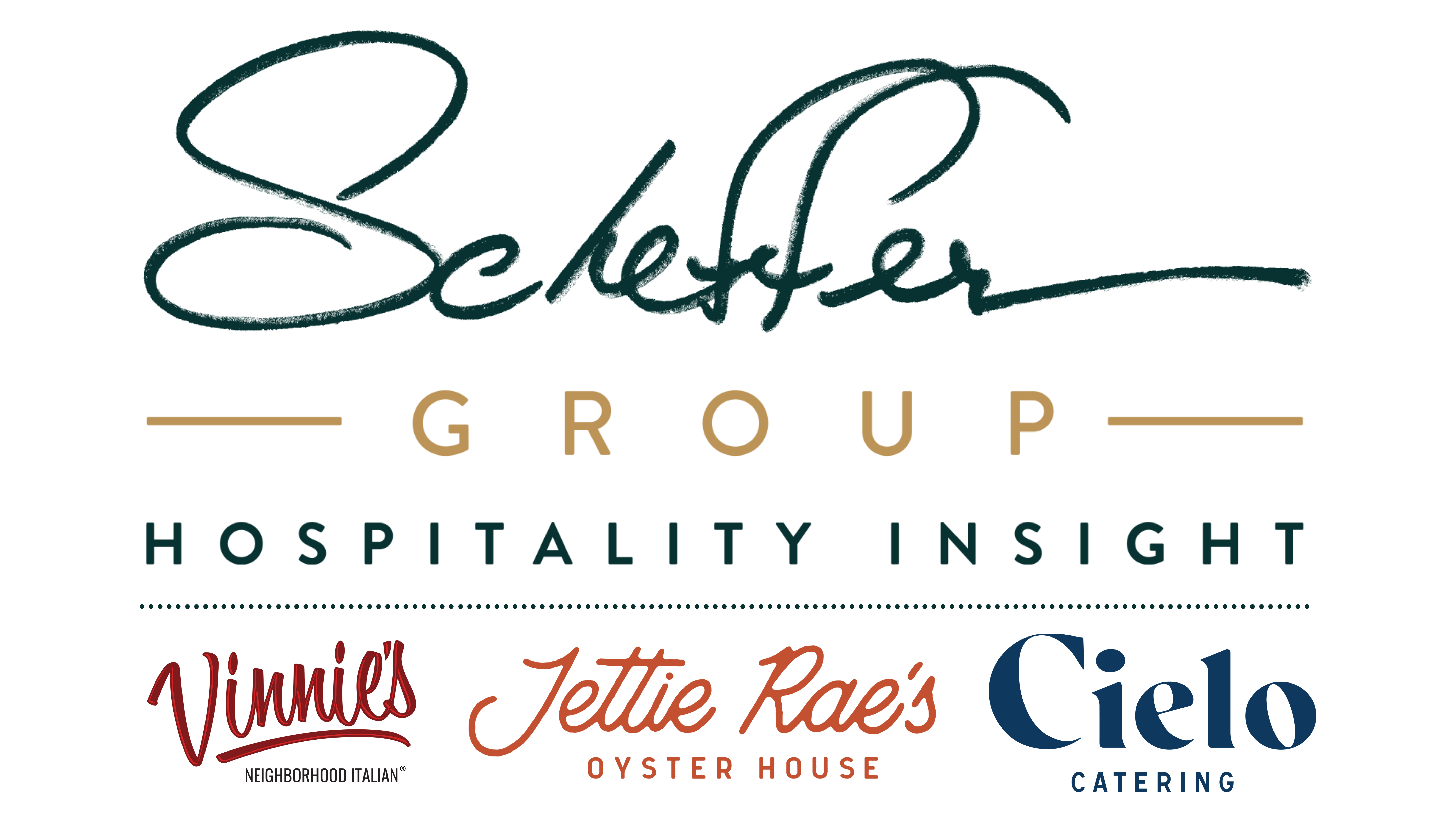Yetzirah 2025 Jewish Poetry Conference: Public Events, June 24-27, 2025
We’re delighted to welcome you to our 2025 Yetzirah Jewish Poetry Conference.
If you’d like to join us online: This year, we’re trying something new for our online events. We’ll have ONE Zoom link for all events, with suggested donation amounts based on how many events you think you’d like to attend. As the conference is our single biggest programming expense of the year, we appreciate your support at the highest level that feels right to you and, if you’re so moved, with a little extra to help support our choice to make these events accessible to those who cannot afford to donate anything.
You can register to join us online here.
If you’d like to join us in-person: Similar to our online events, if you’d like to get your tickets in advance, for all events we’ll have suggested donation amounts based on how many events you think you’d like to attend. As the conference is our single biggest programming expense of the year, we appreciate your support at the highest level that feels right to you and, if you’re so moved, with a little extra to help support our choice to make these events accessible to those who cannot afford to donate anything.
You can register to join us in-person here. (all events will take place in the Highsmith Student Union, Blue Ridge South: HIG203)
PUBLIC EVENTS:
Tuesday, June 24
1:30-2:10 ET, Edward Hirsch: Keynote Address
2:30 ET, A Conversation & Reading with our Keynote Speaker: Edward Hirsch, in conversation with Danny Kraft
8-9:30 ET, Tuesday Fellows & Faculty Reading: Alicia Ostriker, Elizabeth Jacobson, Judith Chalmer, Jared Harél, & Victoria Redel
Wednesday, June 25
1:30-2:45 ET, Favorite Poets: A Lineage of Jewish Poetry: Hadara Bar-Nadav, Owen Lewis, Patty Seyburn, & Jared Harél
3:15-4:30 ET, On Writing Trauma: Joanna Chen, Judith Chalmer, Dina Elenbogen, & Hadara Bar-Nadav
5-6:30 ET, Scholars & Offsite Faculty Reading: Ayelet Amittay, Hannah Butcher-Stell, Robin Rosen Chang, Olga Livshin, Lonnie Monka, Hila Ratzabi, Kathy Schorr, Donna Spruijt-Metz, Betsy Fogelman Tighe, & Yehoshua November
Thursday, June 26
1:30-2:45 ET, Writing Contemporary Midrash: On Poetry Inspired by Sacred Texts: Alicia Ostriker, David Ebenbach, Eve Grubin, & Elizabeth Jacobson
3:15-4:30 ET, Translation as a Jewish Act: Phil Terman, Joanna Chen, & Dan Alter
8-9:30 ET, Thursday Fellows & Faculty Reading: Eve Grubin, Owen Lewis, Dina Elenbogen, David Ebenbach, Hadara Bar-Nadav, & Sharon Dolin
Friday, June 27
1:30-2:45 ET, Contributors Reading: Pearl Abraham, Rachel Davies, Leah Falk, Laurel Kallen, Kyra Lisse, Shir Lovett Graff, Lior Maayan, Robert Manaster, Melissa Rosen, Carly Sachs, Jane Saginaw Lerer, Ma’ayan Seligsohn, Rona Shaffran, Elisabeth Weiss, & Laura Hodes Zacks
5:30-7 ET, Friday Fellows & Faculty Reading: Dan Alter, Patty Seyburn, Philip Terman, Joanna Chen, Rodger Kamenetz, & Dana Levin
We could not do any of this without your support. Thank you.
NAVIGATION MENU:
- Conference Overview (for prospective participants)
- Offsite Option
- Generative Workshops
- Eligibility
- Fees
- Application Timeline
- Application Categories: Contributors, Scholars, & Fellows
- Submitting Your Application
- COVID Policies
- Frequently Asked Questions
CONFERENCE OVERVIEW (back to top)
For participants, Yetzirah’s third Jewish Poetry Conference will be held June 23-29, 2025, in the mountains of Western North Carolina, in partnership with the University of North Carolina—Asheville’s Center for Jewish Studies. Our time together will consist of a mix of generative workshops focused around Jewish questions and themes, discussion panels, craft talks, readings with Faculty and our Fellows, Scholars, and Contributors, as well as many shared meals and celebrations.
It is our aim that the conference will function as an egalitarian community, supporting writers at all levels of their careers. To this end:
- All workshops will be generative, allowing writers of different experience levels to share the same creative space
- To keep this gathering both intimate and manageable, all interested participants will be required to apply, and the number of participants will be limited to 36:
- CONTRIBUTORS—15 open opportunities, for poets with some history of publication
- SCHOLARS—9 poets earlier in their careers, who’ve published up to one full-length collection (the funding for Scholars covers tuition)
- FELLOWS—12 poets who’ve published at least two full-length collections (the funding for Fellows covers tuition, room, & board)
- Edward Hirsch will offer a keynote address and give a featured reading and interview. Learn more about Edward in our Discover Jewish Poets database.
- Sharon Dolin, Dana Levin, and Victoria Redel will serve as our generative workshop faculty.
- We will offer a limited number of manuscript evaluations with Rodger Kamenetz and Alicia Ostriker.
- Afternoon events and evening readings will be open to the community and welcoming to poetry lovers of all traditions, offering an opportunity for local residents to hear work from some of the prominent Jewish poets of our time.
-
- These public readings and events will also be livestreamed and recorded.
-
- For 2025, we’re introducing an expanded offsite offering we’re calling our Dayenu Cohort.
DAYENU COHORT—OFFSITE OPTION (back to top)
While our on-campus cohort of 36 is wonderful—dayenu!—we welcome writers of all levels of experience and all traditions to join us in Asheville as part of the Dayenu Cohort.
We’re doing this to expand the richness of our conference community and, in turn, have some special opportunities to help ensure that offsite participants feel as inspired as those staying on-campus. These offerings include:
- An invitation to join us for our public talks and readings, as well as Shabbat dinner, and Shabbat services on Friday and Saturday morning.
- While you’d of course be welcome to take the mornings to explore Asheville or as private writing time, we will offer a series of morning generative workshops for offsite participants taught by award-winning poet Yehoshua November, who was a Fellow at our first two conferences.
- Dayenu Cohort participants will be listed along with on-campus participants in our conference archive.
To give you a sense of what to expect, find a link to last year’s schedule here.
Fee includes a pass to all public events, communal on-campus Shabbat dinner, and generative workshops: $180
(with sliding scale available if this is a hardship)
Registrations for the Dayenu Cohort will be accepted until May 31, 2025.
To register for this year’s Dayenu Cohort, please click here.
Please note: In order to ensure a supportive and collegial community experience, we reserve the right to respectfully decline the registration of individuals whose communications or behavior leads Yetzirah’s leadership to believe they might not attend in the spirit Yetzirah aims to cultivate at our annual Jewish Poetry Conference and all of our programming.
GENERATIVE WORKSHOPS (back to top)
Our generative workshops will be led by Sharon Dolin, Dana Levin, and Victoria Redel. Participants will be divided into three workshop cohorts, which will attend a different class each day of the conference, allowing participants to work with all three of our faculty.
Called by Avivah Zornberg “a powerfully gifted psalmist,” Sharon Dolin is the author of seven books of poetry, most recently Imperfect Present (University of Pittsburgh Press, 2022) and Manual for Living (Pittsburgh, 2016). Her fourth book, Burn and Dodge (Pittsburgh, 2008) won the AWP Donald Hall Prize for Poetry. She is also the author of Hitchcock Blonde: A Cinematic Memoir and two books of translation from Catalan: Book of Minutes, by Gemma Gorga, and Late to the House of Words: Selected Poems by Gemma Gorga, winner of Saturnalia Books’ Malinda A Markham Translation Prize and shortlisted for the 2022 Griffin Poetry Prize. A 2021 NEA Fellowship recipient, Fulbright Scholar, Pushcart Prize Winner, and recipient of a Witter Bynner Fellowship from the Library of Congress, Dolin lives in New York City, where she is Associate Editor of Barrow Street Press and teaches poetry workshops. Learn more about Sharon in our Discover Jewish Poets Database.
Sharon’s Workshop: God-Wrestling: Poetry as Prayer
A poem is “an act of attention” according to D.H. Lawrence, and according to Simone Weil, “Absolutely unmixed attention is prayer.” In this generative workshop we will explore the realm of poetry as prayer. In Jewish liturgy, there is nothing more central than the psalms, which are lyric poems—an individual voice addressing God. Starting with the psalms and moving on to other devotional and defiant voices, this generative workshop will focus on poems as prayers from Jewish and non-Jewish voices, including Gerard Manley Hopkins, Denise Levertov, Leila Chatti, Yehuda HaLevi, Yona Wallach, and Allen Ginsberg. What happens when we open ourselves up to addressing the Divine Presence/Shekhina (or the possibility of one) that is invisible and omnipresent? How can we explore and challenge through poetry our own fundamental beliefs including unbelief? If one meaning of the name Israel is God-wrestlers, the poems you will be invited to read and write will all be ways of grappling with the Divine. Believers and nonbelievers are welcome.
Dana Levin is the author of five books poetry. Her latest is Now Do You Know Where You Are (Copper Canyon Press), a 2022 New York Times Notable Book and NPR “Book We Love.” Other books include Banana Palace (2016) and Sky Burial (2011), which The New Yorker called “utterly her own and utterly riveting.” Recent poems and essays have appeared in Poem-a-day, Best American Poetry, The American Poetry Review, and Poetry, among other publications. She is a grateful recipient of many honors, including those from the National Endowment for the Arts, PEN, and the Library of Congress, as well as from the Rona Jaffe, Whiting, and Guggenheim Foundations. With Adele Elise Williams, she co-edited Bert Meyers: On the Life and Work of an American Master (2023) for the Unsung Masters Series. Levin teaches for the Bennington Writing Seminars, the MFA program at Bennington College, and serves as Distinguished Writer in Residence at Maryville University in St. Louis. Learn more about Dana in our Discover Jewish Poets Database.
Dana’s Workshop: Wandering in the Wilderness
Writing: it can feel like an experience of divine guidance—and divine abandonment. How does captivity in doubt, inspiration’s rescue, and wandering in uncertainty inform your writing practice? What is your personal golden calf, the false idol you think can tell you “I am who I am” as a writer? In this workshop, we will engage the writer’s wandering in wilderness through psychological, spiritual, and aesthetic lenses, with generative writing leading the way. A few weeks before the conference, participants will be encouraged to survey their current drafts and identify the poem—or the subject matter—they just can’t seem to “bring home” and actualize its promise. I will send you instructions for how we will make use of this material to generate more poetry. Our session together will be aided also by a deep dive into Allen Ginsberg’s Howl, one of the crucial twentieth century chronicles of exile and return.
Victoria Redel is a first-generation American author of four books of poetry and five books of fiction, most recently the collection Paradise (2022) and the novel Before Everything. Victoria’s work has been widely anthologized, awarded, and translated in ten languages. Her debut novel, Loverboy (2001) was adapted for feature film directed by Kevin Bacon. Redel’s short stories, poetry and essays have appeared in Granta, The New York Times, the Los Angeles Times, Bomb, One Story, Salmagundi, O, and NOON among many others. She has received fellowships from the Guggenheim Foundation, The National Endowment for the Arts and the Fine Arts Work Center. Victoria is a professor in the graduate and undergraduate Creative Writing programs at Sarah Lawrence College and lives in New York City. Learn more about Victoria in our Discover Jewish Poets Database.
Victoria’s Workshop: Persona: Finding Self Through Empathic Voice and Imagination
In Kabbalah, Tikkun Olam, the repair, is a mystical return through ritual performance. Might slipping on the “mask” of persona in poetry be a way to that divine light and to our most empathic selves? Additionally Persona allows us to slip off the self, freeing us from the burden of personal history. In our workshop we will consider where the I begins separate from the voices, ancestors, characters, cultural figures that inform it. How do we feel another? How deeply can we allow ourselves to experience another and what do we learn about ourselves that we dare not see when we stare in the mirror. What are our choices, opportunities and obligations as we assume persona? With exercises and examples by Adrienne Rich, Marie Howe, Louise Gluck, Olga Broumas and others we will consider the gift of persona.
ELIGIBILITY (back to top)
Regardless of your religious practice or lack thereof, or whether you think of yourself or your writing as “Jewish enough,” applications are open to anyone who self-identifies as a Jewish poet and feels that such a gathering would be meaningful to them and to their poetry. In addition, we require the following:
- All applicants must be 21 years of age or older by the start of the Conference in July 2025
- To cultivate community, all applicants will be required to stay on campus (though apartments will be shared, all rooms will be single-occupancy, with accessible accommodations available)
- We also ask that participants attend all official events, unless their health requires otherwise
- All participants will agree to take a COVID test if requested due to possible exposure (tests will be provided). More extensive COVID policies can be found below
- All applicants will need to show proof of a negative COVID test taken within 24-hours before the first day of the conference
- FOR RETURNING PARTICIPANTS: In order to have continuity in our community year-to-year, while also making room for new participants, we ask that if a participant has joined us for two years in a row, they wait a year until applying to be a Fellow, Scholar, or Contributor.
- On these off years, we welcome all participants to join us as part of the Dayenu Cohort.
FEES (back to top)
- The non-refundable application fee is $20 (this can be waived if this fee is a hardship).
- Fellows receive free tuition, room, & board, which covers breakfasts and lunches and two shared on-campus dinners. They are responsible for their travel and four dinners off-campus.
- Scholars receive free tuition. They are responsible for room & board ($700), which covers breakfasts and lunches and two shared on-campus dinners, and for their travel, and four dinners off-campus.
- Contributors are responsible for tuition ($800), room & board ($700), which covers breakfasts and lunches and two shared on-campus dinners, travel, and four dinners off-campus.
- Thanks to an anonymous donor, up to $5,000 of need-based funds will be available for accepted participants through The Miles and Mimi Coon Scholarship Fund. The individual amounts will be based on how many accepted participants apply for funding.
- Dayenu Cohort: Fee includes a pass to all public events, communal on-campus Shabbat dinner, and generative workshops: $180
- Sliding scale available if this is a hardship.
- If you will not be applying to join us on-campus, or signing up for the Dayenu Cohort, and are only interested in attending the public conference events, an in-person pass for all public events will be available for $108.
- Tickets for individual events, in-person and online, will also be available, with a suggested price of $18.
APPLICATION TIMELINE (back to top)
February 1, 2025: Application period opens for all prospective participants
*To aid in the ease of our considerations, we ask that you apply as early as possible within the given application window. But please note that applications will not be taken before February 1.
For all applicants:
February 21, 2025: Application deadline
March 14, 2025: Notifications sent to all applicants
March 30, 2025: Registration deadline (a deposit of $200 will be due at this time. This will go toward Scholar’s room & board. It will be returned Fellows after the conference.)
*a waitlist of Scholars, Fellows, & Contributors will be created if an opportunity becomes available
APPLICATION CATEGORIES: CONTRIBUTORS, SCHOLARS, & FELLOWS (back to top)
CONTRIBUTORS
Applicants who wish to join the Yetzirah Jewish Poetry Conference as a Contributor should have a deep love of and commitment to poetry and interest in engaging further with its intersections with Jewish culture and tradition. As our largest contingent within the on-campus cohort, Contributors play a vital role in creating our community’s culture, as well as in supporting the conference, which is the most significant of Yetzirah’s annual programming expenses. Though we only require that Contributors have some record of publication, as well as a recommendation for previous experience attending generative creative writing workshops, the Contributors at both of our prior conferences were largely composed of accomplished writers who’d originally applied as either a Scholar or Fellow.
-
- Fees: $1,500 tuition, which includes room & board (breakfasts, lunches, and two shared dinners)
SCHOLARS
Applicants who wish to join the Yetzirah Summer Conference as Scholars may have published up to one full-length collection of poetry, but no book-publication is required.
Competitive applicants will have published, since January 1, 2018, (not including self-published work) a minimum of:
- at least 20 or more individual poems or pages of poetry that appear in at least five literary journals, anthologies, or publications that regularly include poetry as a portion of their format.
- Up to 16 pages of that poetry may be from a single volume of poetry that is fewer than 48 pages (e.g. a chapbook)
We believe people of any age can be an “emerging” poet and welcome writers who fulfill the above requirements, young and old, to apply for this fellowship.
-
- Fees: $700 for room & board only (funding for Scholars covers the full $800 tuition )
- In addition to waived tuition, each Scholar will be paired with a Conference Fellow to receive mentorship that includes a manuscript evaluation (of no more than 10 pages)
FELLOWS
Applicants who wish to join the Yetzirah Summer Conference as established poets should have published at least two full-length collections by a nationally-distributed press and have a strong record of publication.
- Fellows receive free tuition, room, & board. In exchange, fellows will be expected to do no more than two of the following (with individual preferences respected as much as possible):
- Be part of a discussion panel
- Give a craft talk
- Give a subject-based talk
- Act as a mentor for an emerging writer (all formal mentorship will be confined to the duration of the conference, and will include a 10-page manuscript consultation)
- Give a reading
SUBMITTING YOUR APPLICATION (back to top)
**Applications will be open February 1-21. Please do not submit an application outside of that window.**
- Submit your application through one of the following forms:
Contributor applications can be found here.
Scholar applications can be found here.
Fellow applications can be found here.Registrations for the Dayenu Cohort are accepted until May 31. To register for the Dayenu Cohort, please fill out this form, and feel free to disregard the rest of these application instructions.
2. Create a 5-page writing sample (12-point font, 1-inch margins) containing no more than one poem per page.
The poems can be published or unpublished. If a poem has been published previously, please indicate the publication details at the top of the page. Poems will be read for their craft, not for their engagement (or lack thereof) with Jewish themes, and the poem’s publication history will count neither for nor against your application.
Save your writing sample with the following naming convention:
First Initial Last Name.Type of Applicant.Sample
Example file name: JJacobs.Contributor.Sample
3. Next, click here to pay the $20 application fee.
As we want our conference to be as accessible and welcoming as possible, if this fee would be a hardship for you, we’ve also provided an option for a fee-free submission at the link above. Even if you are submitting a fee-free application, please fill out the form for a $0 submission through the link above, in order to help us maintain accurate application records. This will, of course, play no part in our consideration of applications.
4. Finally, please send your writing sample as an attachment to Danny Kraft, [email protected]
COVID POLICIES & PRACTICES (back to top)
FREQUENTLY ASKED QUESTIONS (back to top)
On January 26, 2025, Jessica Jacobs & Danny Kraft gave a brief overview of the conference followed by a Q&A, which included testimonials from past conference participants. If you weren’t able to join us, you can find the video here.
Q: I was a participant at a previous Yetzirah conference. Can I still apply?
A: In an effort to expand our community and give more poets a chance to be a part of the conference, if you’ve attended the conference two years in a row, we ask that you wait one year before applying.
Q: Who will be reading my application?
A: Yetzirah’s Board of Directors and staff will be considering applications, and each application will be read by at least two people.
Q: What factors will be a part of evaluation applications?
A: First and foremost, we’ll be looking at the strength of the writing sample submitted. We will then take into consideration the overall needs and balance of the conference, including mentorship roles, discussion panels, etc.
Q: Do I need to have an MFA to be considered for a fellowship?
A: No.
Q: If I apply to be a Scholar or a Fellow and am not accepted, can I still apply as a Contributor?
A: On the application form, you can select if you’d also like to be considered as a Contributor. No further application is necessary.
Q: With different types of participants, will the conference feel hierarchical?
A: Though participants will be tasked with different responsibilities, all 36 of our participants will be treated as equal members of our community. As our conference continues, we hope that one year’s Contributor will be the next year’s Scholar; one year’s Scholar, the next year’s Fellow; and so on, creating an experience that supports Jewish poets at all stages of their career.
Q: Can I receive feedback on my application?
A: Unfortunately, because Yetzirah is a small nonprofit with a limited staff, we are unable to provide feedback on individual applications.
Q: Can I apply if I live outside of the U.S.?
A: Yes! We welcome anyone who identifies as a Jewish poet.
Q: What is campus housing like?
A: Yetzirah participants will be housed in one of the newest dorms on campus. Apartments will have between 3-5 participants with shared bathrooms and a kitchen (there will be a refrigerator, but little to no cookware), with all rooms single-occupancy. Bed linens and towels will be provided.
Q: Is UNCA accessible?
A: Accessible housing will be available and all classrooms, event spaces, and common rooms will be wheelchair-accessible. You can visit UNCA’s Office of Academic Accessibility to learn more. And if you have specific concerns or questions, please contact us at [email protected].
Q: Will kosher food be available on campus?
A: Breakfasts and lunches will be held in the Highsmith Union Food Court. Food certified kosher will not be available there but a-la carte vegetarian and vegan meals will always be available. For dinners we provide, we will do our best to honor our participants’ dietary needs. We will be happy to order kosher food delivery on request or to receive others’ kosher food delivery, and will have at least one kashered microwave available.
Q: The conference goes from Monday to Sunday. How will Shabbat be observed?
A: All classes and afternoon events will conclude before sundown and all participants will be invited to attend a shared Shabbat dinner. On Saturday, sabbath observances will be based on the practices and needs of our participants. Asheville is home to Chabad-Lubavitch WNC, Congregation Beth Israel, and Congregation Beth HaTephila. For our more secular participants, Saturday will be a day open to explore Asheville and its beautiful surroundings. On Saturday evening, we will all gather back together for a closing Havdalah bonfire.
Q: Can my family join me on campus for the conference?
A: Friends and family are welcome at all events open to the public, which include afternoon and evening events. We are unable to offer on-campus accommodations to anyone other than conference participants (and we ask that all accepted participants commit to staying on campus).
Q: I was invited to attend the Conference as a Contributor, Scholar, or Fellow; can I definitely give a reading?
A: Yes! We have created a schedule in which all of our community will have a designated time in which to share their work.
Other questions? Please email Danny Kraft, [email protected].
